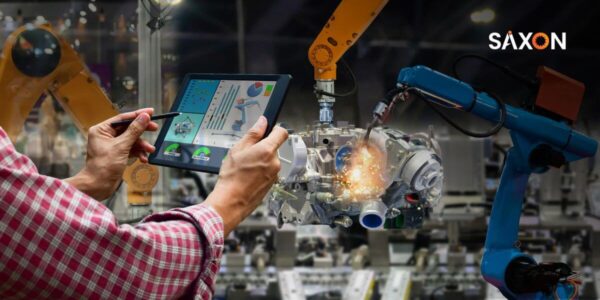The manufacturing industry has already been using Artificial Intelligence (AI) since the fourth industrial revolution. We can see robots doing heavy work on the production floor with great accuracy and efficiency. However, manufacturers didn’t get to use AI much in their business operations. Now, with the entry of generative AI in manufacturing, you have an opportunity to transform your back-office operations and drive business growth.
In a survey by Capgemini, almost 50% of executives said that generative AI is disrupting their manufacturing business. So, how is generative AI going to transform the manufacturing industry?
Let’s explore.
Five Major Applications of Generative AI in Manufacturing
Improving product design and development
For manufacturers, time-to-market is an important metric. Given the competition, demand, and changing market dynamics, you have to innovate fast and produce faster. However, there are some challenges in achieving faster time to market in manufacturing. Your product might involve a large number of components and complex challenges. This hinders innovation and slows down production. Generative AI can help you challenge traditional product design and expedite time to market.
You can train GenAI models with your existing designs and the parameters and conditions you considered for those designs. GenAI can also analyze the feedback received for your designs. Leveraging AI/ML algorithms with the data, GenAI can create product designs that match your requirements faster.
Aircraft manufacturer Airbus leveraged generative design processes to design their partition walls. The artificial intelligence algorithms helped Airbus reduce the weight of the walls by almost half and save fuel costs. Similarly, you, too, can utilize generative AI based on your manufacturing data in your product design and development.
Ensuring quality control
Quality control in manufacturing is of paramount importance. Ensuring products meet established standards and customer expectations is important. However, inconsistent inspections, human errors, and the complexity of modern production processes hinder effective quality control. Why do inconsistent inspections arise? This is mainly due to the sheer volume and complexity of manufacturing processes. So, human inspectors might not detect every defect.
You can leverage generative AI to address these challenges. GenAI utilizes advanced algorithms to analyze vast datasets. This process also quickly identifies defects and anomalies that might be missed by manual inspection.
Human errors impact the accuracy and reliability of your quality assessments. You need consistent and objective quality evaluations to eliminate the room for errors. Generative AI can come in handy for you in this case. GenAI-powered tools can learn from previous quality assurance information and help you evaluate processes more efficiently.
Manufacturing processes are getting more complex. So, identifying and addressing product defects is getting tough. GenAI can read information from sources in real time, analyze it, and identify potential threats with minimal effort from you. So you can make sure your customers won’t get defective products.
Generating synthetic data for training AI systems
Speaking on a podcast, Ford’s Nikita Jaipuria said, “When you start mixing synthetic data with real data, that’s when you start seeing boosts in performance, especially to unseen scenarios and datasets.”
In Industry 4.0, synthetic data has emerged as a valuable asset for manufacturers. You can mirror real-world scenarios using diverse datasets and train machine learning algorithms while ensuring data safety. Producing high-quality synthetic data itself is a challenge for manufacturers. Why, you ask? Manufacturing involves intricate processes and interactions between machines, materials, and human operators on the production floor. So, striking the right balance between data authenticity and diversity to replicate real-world scenarios accurately is indeed challenging.
You can utilize generative AI to tackle this challenge. Gen AI can simulate complex manufacturing scenarios and generate accurate synthetic data, capturing the nuances of sensor readings, machine interactions, and production variables. You can use this synthetic data to train your AI models and enable them to work with more precision.
Enhancing supply chain management
What can supply chain disruptions do to a manufacturer? We have witnessed how catastrophic the consequences would be during the pandemic and when the Suez Canal got blocked. Supply chain management is critical for manufacturers. Supply chain technologies have been evolving for better optimization and more efficiency. Generative AI can also join this club.
Let’s discuss a few of the supply chain management challenges – demand forecasting, risk management, and supplier relation management.
Fluctuations in consumer preferences, market trends, and unforeseen events can disrupt production planning and inventory management. So, you need to forecast demand accurately. By leveraging historical data and external factors, Generative AI predicts demand patterns with great precision. It identifies hidden correlations and enables you to align production and inventory levels with actual demand. So you can maintain optimal stock levels and reduce operating costs.
Another critical aspect of supply chain management is risk management. Some external factors are not in your control. For example, you cannot say when the war is going to stop. Or when a pandemic hits the world. However, you can forecast the risks using generative AI’s ability to process and analyze vast amounts of data. You can create simulation models that assess potential risks and devise strategies to mitigate them. These possibilities ensure business continuity and minimize production disruptions.
Generative AI also enhances supplier relationship management. You can use AI-driven analytics to evaluate supplier performance, assess their reliability, and identify potential collaboration opportunities. This informed decision-making improves supplier selection, fosters strategic partnerships, and contributes to cost savings and better overall supply chain efficiency.
Skill development and knowledge management
Skill development and knowledge management are pivotal for sustaining competitiveness in the manufacturing sector. However, challenges like the aging workforce, knowledge transfer gaps, and the rapid evolution of technologies pose hurdles in maintaining a skilled workforce and effective knowledge dissemination.
The aging workforce is a pressing concern. As experienced employees retire, they take with them valuable institutional knowledge. Capturing this tribal knowledge and transferring it to younger employees is challenging because traditional methods like manuals and training sessions might not suffice in today’s dynamic manufacturing landscape.
Generative AI, with its ability to convert existing documents, product manuals, and informal communications into structured knowledge repositories, can address this challenge. By understanding context and intent, gen AI can create interactive tutorials and manuals to facilitate smooth and efficient knowledge transfer. This capability of gen AI will also help your employees reskill and upskill themselves at their own pace to add more value to your company and themselves.
Barriers to Adopting Generative AI in Manufacturing
Embracing generative AI in manufacturing will bring a paradigm shift. However, there are a few challenges facing manufacturers.
Change management readiness is essential, involving alignment across suppliers, customers, and the workforce to embrace the opportunities GenAI can offer. Roadblocks like data quality and technical debt demand attention; the efficacy of any algorithm hinges on the quality of input data, and technical debt can hinder new investments.
Governance becomes paramount, as organizations must monitor GenAI throughout its asset’s life, ensuring integrity, bias mitigation, accuracy, and security. The question of risk appetite looms large—what are the potential risks and benefits of GenAI engagement? Defining a designated area of application is crucial, recognizing that GenAI isn’t one-size-fits-all; tailored investments based on market position, leadership, and adaptability are crucial.
Want to evaluate your readiness for embracing generative AI?
We are happy to help you! At Saxon AI, we help manufacturers and other enterprises understand the potential of generative AI and create tailored implementation strategies. Through our two-day workshops, Generative AI Consulting Workshop and InnovAIte, our experts will collaborate with you exclusively to identify potential use cases for generative AI in your business and implement efficient solutions.
Want to learn more about our workshops and generative AI services?
















